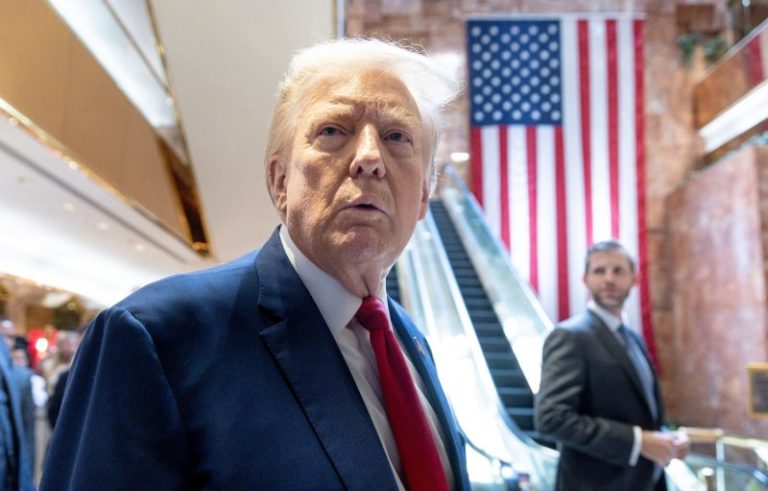Having first attempted to make his case in a court of law, former president Donald Trump on Friday afternoon turned to the court of public opinion.
Earlier in the day, he had joined his legal team as they sought to overturn the verdict in the civil trial that found him liable for sexually assaulting writer E. Jean Carroll, an attack Carroll documented in a book excerpted by New York magazine. Their case made, however effectively, the group migrated north to Trump Tower, where Trump unloaded on the case and on Carroll in front of cameras.
Trump came prepared, in his way. As he walked through various components of the case, including similar allegations from other women who have claimed that Trump had assaulted them, he referred to notes written on cards emblazoned with the logo of his 2024 presidential campaign. “No police report,” one said in Trump’s distinctive black-marker scrawl. “No witnesses.”
Eventually he got to one of the most telling elements of Carroll’s case, the one that not only proved the two had met before the assault but that also eventually undercut Trump’s perverse insistences that he wouldn’t have found Carroll attractive in the first place.
The photo was included in the 2019 New York magazine article, showing a laughing Carroll face-to-face with Trump and his then-wife at an event in the late 1980s. The photo’s original caption described the image as showing “Carroll, Donald and Ivana Trump, and Carroll’s then-husband, television-news anchor John Johnson, at an NBC party around 1987.”
But Trump is never one to accept documentation as convincing. After The Washington Post published the “Access Hollywood” tape in which Trump described assaulting women in a manner similar to what Carroll alleged, he told some allies that the audio was not authentic (despite having admitted to making the comments when they were first revealed). When Vice President Kamala Harris had large crowds at an event in Michigan, Trump falsely claimed that images of the event were generated by artificial intelligence.
That’s what he said about the Carroll photo on Friday, too.
“They have a picture from, they say, about 40 years ago, a picture,” Trump said. “And the picture depicts her and her husband on a celebrity line where I was the celebrity. I was — been a celebrity for a long time. And they were shaking my hands along with hundreds of other people. Nobody even knows where it is.”
As the caption indicated, it was apparently at an NBC party.
“All I can say is that I never met the woman other than this picture, which could have been AI-generated, I don’t know,” Trump said later. “Showed up out of nowhere, but it’s just fine. Nice picture with her, her husband and lots of other people are on line. It’s a celebrity line.” He then again reiterated that he was famous at the time.
There is no way that the image was generated by artificial intelligence. For one thing, there’s no reason to believe that it is, that Trump — who was a fixture in the New York social scene at the time — wouldn’t have been in the presence of a local television star and his writer wife. There’s no reason to believe that Carroll, eager to make her case in her book and to the magazine, took out her supercomputer and created a convincing simulation of such an encounter.
Particularly since, when the New York excerpt was published, the technology to make convincing photos was not yet available. By now, we’re all familiar enough with the technology to have it feel as though it’s been around for a long time, but it hasn’t been. It wasn’t until years after the book came out that even the first rudimentary AI models were available. Even today, generating an image with the clarity and accuracy of that photo would be tricky.
Of course, Trump hasn’t always viewed the photo as all that clear. When he was being deposed as part of Carroll’s lawsuit, he was shown a copy of the image and referred to it as “blurry” — perhaps a manifestation of his aversion to wearing corrective lenses in public. He had been shown the picture to see if he could identify the woman standing in front of him; that is, Carroll.
He did identify her, albeit incorrectly. He said that the photo showed not Carroll but Marla Maples, the woman with whom he carried on an affair before divorcing his first wife, Ivana. So much for the bizarre excuse — jaw-droppingly reiterated on Friday — that he wouldn’t have found Carroll attractive.
But this was how the whole news conference went. Those notes on the campaign stationery were part of a broad, scattershot effort to raise whatever doubt he could. It seems safe to say that his campaign team would probably have preferred he not say anything at all.

